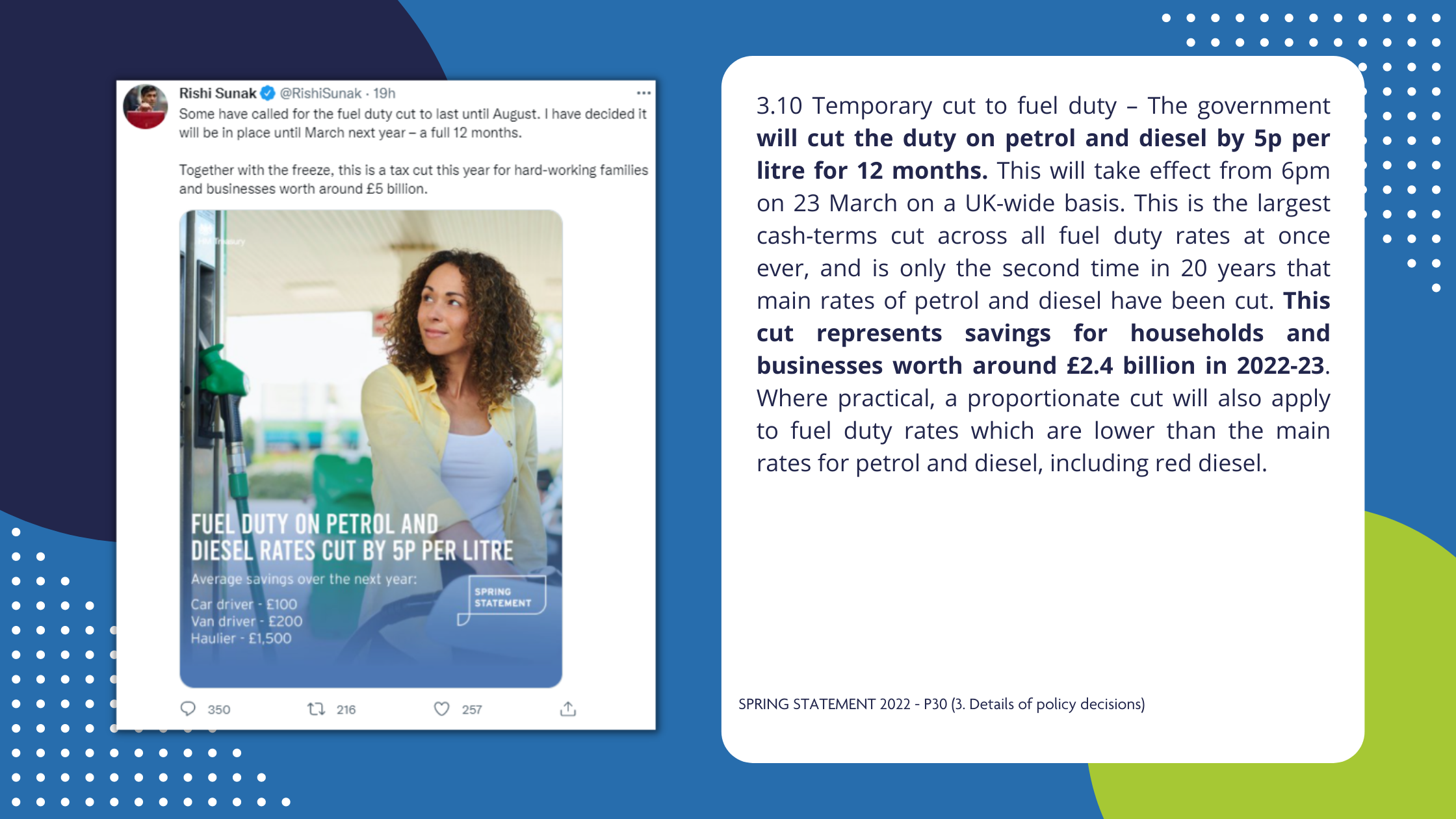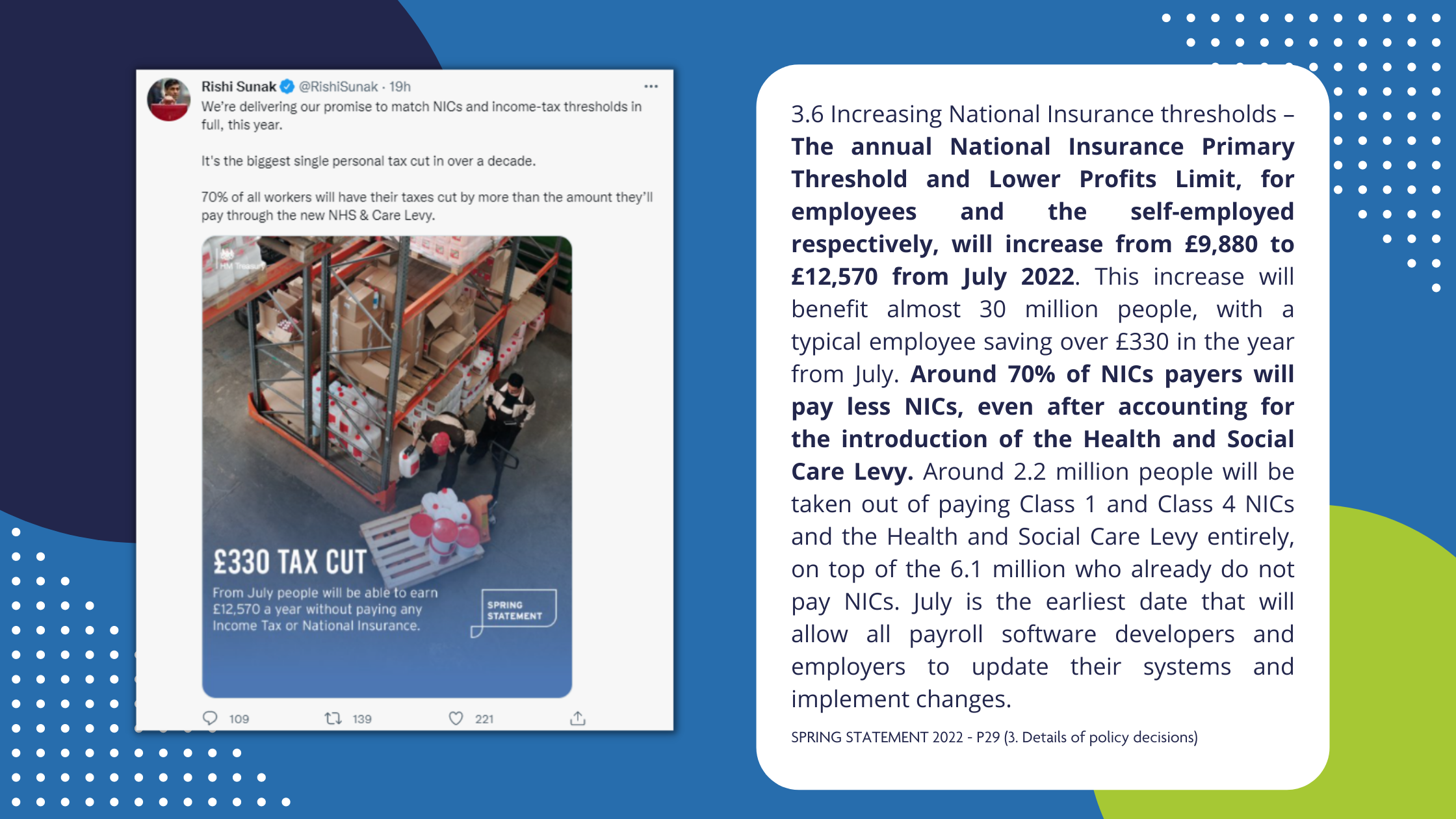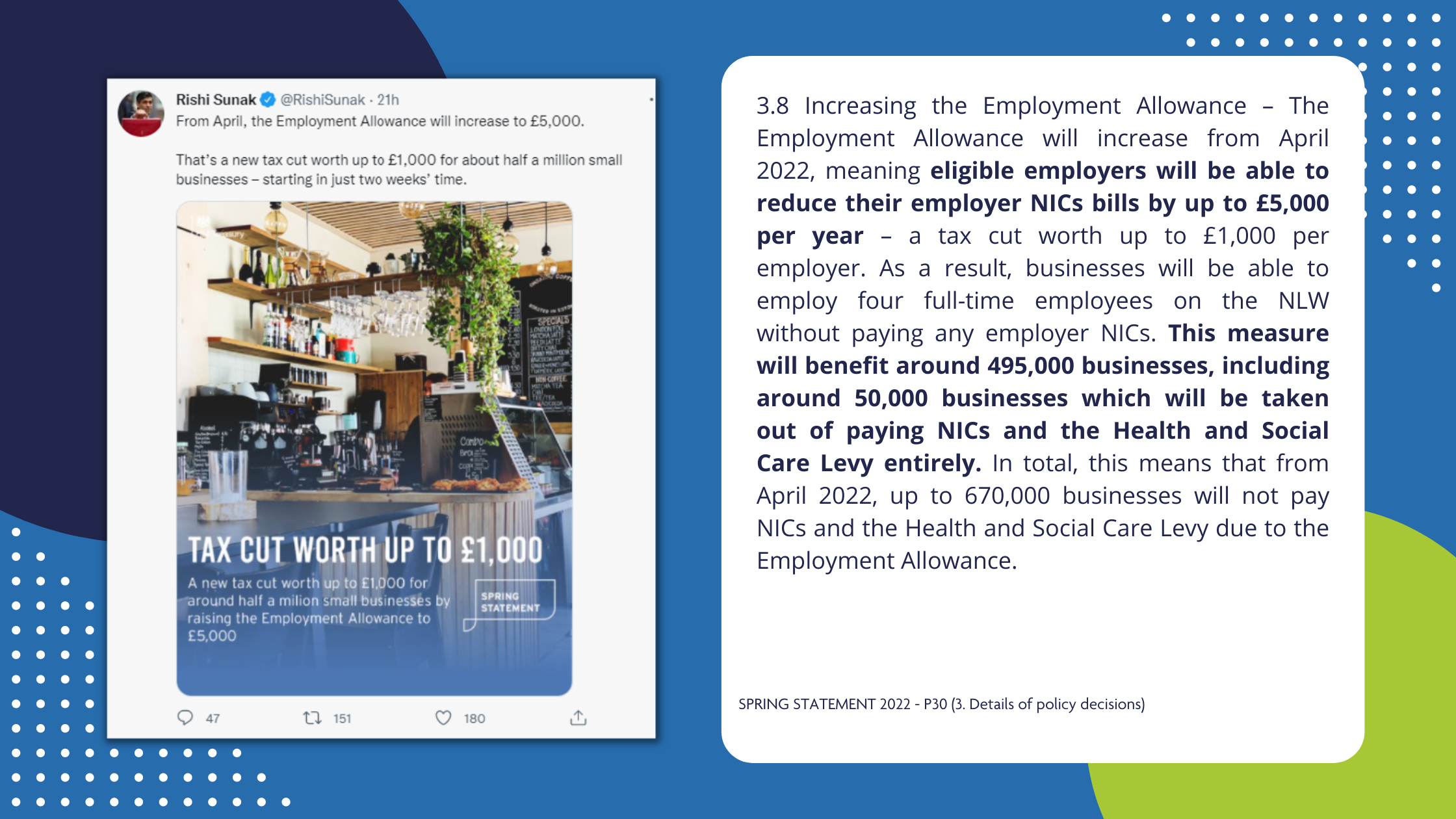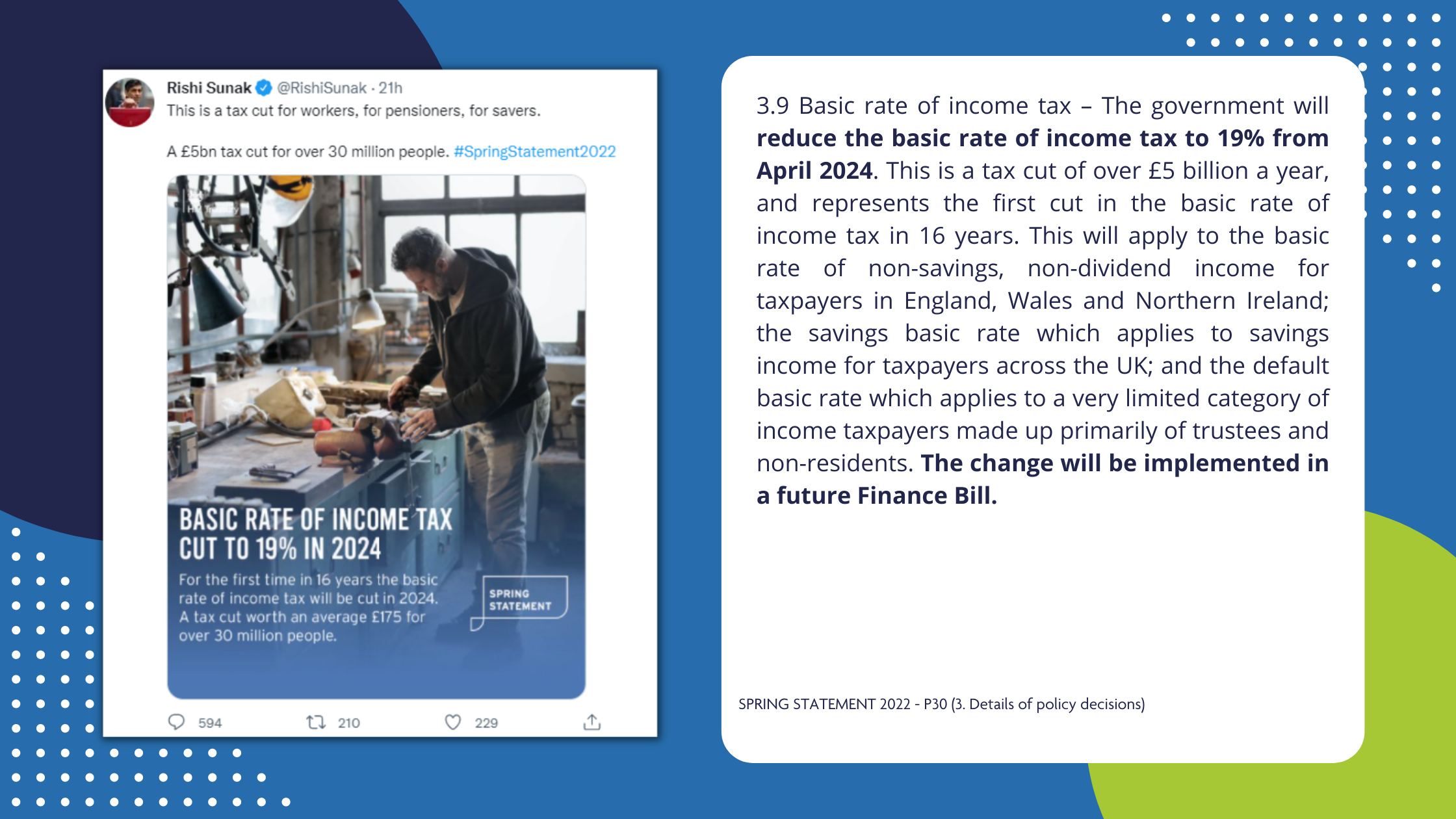It was a short – yet sweeping – statement from the Chancellor, so we’ve been through the published Spring Statement 2022 to make sure you’ve got the full information behind the headlines of Rishi Sunak’s speech to Parliament.
All quoted text is from the Spring Statement 2022 as published on gov.uk
Temporary cut to fuel duty: “A tax cut this year for hard-working families and businesses worth around £5 billion”
Behind the headlines from the Spring Statement:
3.10 Temporary cut to fuel duty – The government will cut the duty on petrol and diesel by 5p per litre for 12 months. This will take effect from 6pm on 23 March on a UK-wide basis. This is the largest cash-terms cut across all fuel duty rates at once ever, and is only the second time in 20 years that main rates of petrol and diesel have been cut. This cut represents savings for households and businesses worth around £2.4 billion in 2022-23. Where practical, a proportionate cut will also apply to fuel duty rates which are lower than the main rates for petrol and diesel, including red diesel.
Increasing National Insurance thresholds: “It’s the biggest single personal tax cut in over a decade”
Behind the headlines from the Spring Statement:
3.6 Increasing National Insurance thresholds – The annual National Insurance Primary Threshold and Lower Profits Limit, for employees and the self-employed respectively, will increase from £9,880 to £12,570 from July 2022. This increase will benefit almost 30 million people, with a typical employee saving over £330 in the year from July. Around 70% of NICs payers will pay less NICs, even after accounting for the introduction of the Health and Social Care Levy. Around 2.2 million people will be taken out of paying Class 1 and Class 4 NICs and the Health and Social Care Levy entirely, on top of the 6.1 million who already do not pay NICs. July is the earliest date that will allow all payroll software developers and employers to update their systems and implement changes.
Increasing the Employment Allowance: “A new tax cut worth up to £1,000 for about half a million small businesses”
Behind the headlines from the Spring Statement:
3.8 Increasing the Employment Allowance – The Employment Allowance will increase from April 2022, meaning eligible employers will be able to reduce their employer NICs bills by up to £5,000 per year – a tax cut worth up to £1,000 per employer. As a result, businesses will be able to employ four full-time employees on the NLW without paying any employer NICs. This measure will benefit around 495,000 businesses, including around 50,000 businesses which will be taken out of paying NICs and the Health and Social Care Levy entirely. In total, this means that from April 2022, up to 670,000 businesses will not pay NICs and the Health and Social Care Levy due to the Employment Allowance.
Basic rate tax cut: “A £5bn tax cut for over 30 million people”
Behind the headlines from the Spring Statement:
3.9 Basic rate of income tax – The government will reduce the basic rate of income tax to 19% from April 2024. This is a tax cut of over £5 billion a year, and represents the first cut in the basic rate of income tax in 16 years. This will apply to the basic rate of non-savings, non-dividend income for taxpayers in England, Wales and Northern Ireland; the savings basic rate which applies to savings income for taxpayers across the UK; and the default basic rate which applies to a very limited category of income taxpayers made up primarily of trustees and non-residents. The change will be implemented in a future Finance Bill.
What’s in the Spring Statement that wasn’t in the headlines?
For Self-Employed people
3.7 Reducing Class 2 NICs payments for low earners – From April, self-employed individuals with profits between the Small Profits Threshold and Lower Profits Limit will not pay class 2 NICs, meaning lower-earning self-employed people can keep more of what they earn while continuing to build up National Insurance credits. Over the year as a whole, the Lower Profits Limit, the threshold below which self-employed people do not pay National Insurance, is equivalent to an annualised threshold of £9,880 between April to June, and £12,570 from July. This change represents a tax cut for around 500,000 self-employed people worth up to £165 per year
HMRC investments
3.15 Additional compliance resource for HMRC – The government is investing £161 million over the next five years to increase compliance and debt management capacity in HMRC. This investment is forecast to bring in more than £3 billion of additional tax revenues over the next five years, by funding additional HMRC staff to provide greater support to taxpayers seeking to pay off accrued tax debts, and to tackle the most complex tax risks, ensuring large and mid-sized businesses pay the tax they owe.
For society
3.19 Levelling Up Fund second round – The government is launching the second round of the Levelling Up Fund and publishes a refreshed Prospectus, inviting bids to come forward from all eligible organisations across the UK. This Fund provides £4.8 billion for local infrastructure projects, with £1.7 billion already allocated to 105 successful projects from the first round.
3.20 Changing Places Fund – The government previously made £30 million available to Local Authorities in England to install life-enhancing Changing Places toilets in existing buildings. Spring Statement is allocating £25.3 million of the Fund to install over 500 life-enhancing Changing Places toilets, in public places and tourist attractions where users want them the most. This will dramatically increase accessibility for thousands of severely disabled people who need specialised facilities. An additional £6.5 million will be allocated to areas where there is little or no provision.
The NHS and the Health and Social Care Levy
3.21 NHS Efficiency – The government is announcing that it will double the NHS efficiency target from 1.1% to 2.2% a year, freeing up £4.75 billion to fund NHS priority areas over the next three years, and ensuring that the extra funding raised by the Health and Social Care Levy is well spent.
Reliable software, expert support
If you’re new to BTCSoftware, you can discover for yourself why UK accountants trust our reliable software and expert support. Get started here.






